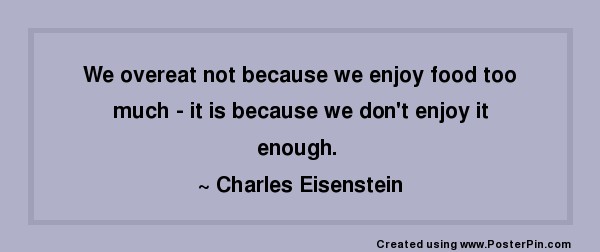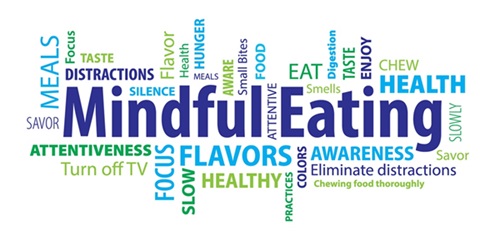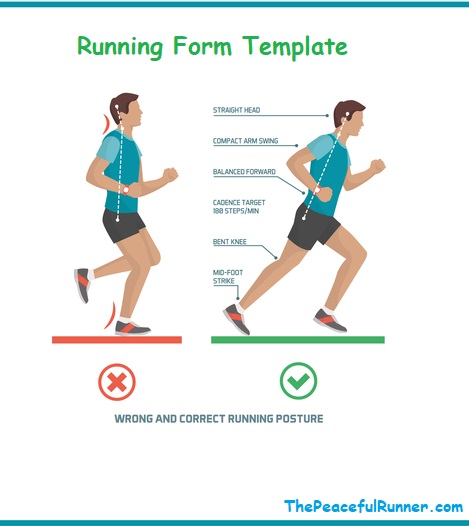- Home
- Running Nutrition
- Mindful Eating
Use Mindful Eating to Manage Weight and Be Happier
FTC Disclosure: As an Amazon Associate, I earn from qualifying purchases. Learn more
Mindful eating transforms not only the way we eat but also our entire approach to life. By developing a mindful relationship with food, we can positively impact our body image, self-esteem, health, relationships, and confidence. We can begin to fully enjoy our meals, feel satisfied, reduce cravings, and strengthen our mind and power of concentration.
Have you ever sat down for a meal and, moments later, realized your plate was empty? You ate without being consciously aware, barely noticed the taste of the food, and missed out on the joy and pleasure of eating.
Where was your mind during the meal? It wasn't on your food. Your focus was elsewhere, far from the joy of eating and nourishing your body. During this vital, nurturing activity, your mind and body were disconnected. How can your food digest properly if your mind isn't aware of or involved in the eating process?
While our stomachs may feel full after eating, we often don't feel satisfied. Mindless eating leaves a void that we try to fill with something else. Practicing mindful eating strengthens the mind-body connection, leading to greater satisfaction and contentment after every meal. In the long run, this practice promotes better health and happiness.
What is Mindful Eating?
Mindful eating is the practice of being consciously aware of everything we experience while eating. We are fully present and totally aware of each movement and each sensation. We notice how the food looks and smells, how each bite tastes, and its texture. We are aware of when we pick up a fork or spoon, when we bring the food to our mouth, how we put it in our mouth, how we chew it, how we swallow it, etc. We use all our senses to participate in the ritual of eating. It is a mindful meditation practice that we integrate with eating.
Eating mindfully is not about control or willpower. Most diets and health programs focus on food restrictions, self-control and portion control. This mindful practice helps us form new habits through acceptance and awareness. We become aware of our thoughts and reactions to food. We become non-reactive to negative thoughts and feelings that often cause overeating. With a non-judgmental approach to our habits and feelings, we accept them with compassion and let them go.
A mindful eating practice is a healthy approach to weight maintenance or weight loss. The focus is not on "loss" of weight or on the "loss" of our favorite foods. With this practice, we enjoy food more and we feel more satisfied as we make choices that feel good for our body. We can enjoy having only one or two pieces of chocolate and feel truly satisfied. The urge to eat the whole chocolate bar will be gone as cravings begin to disappear and we gain control of our relationship with food.
Most mindful eaters find that they feel full sooner and are satisfied with less food than before. This mindful practice may help us discover and overcome false beliefs about ourselves that affect our weight.
Gratitude is a spiritual practice, and it is an essential part of mindful eating. Make it a habit to feel thankful and grateful for each meal as you sit down to eat.
Think about how pleasing
and inviting the food looks and smells. Think about where it came from
and all the energy that was required to bring it to your plate. Think about the nourishment that it provides your body. Take a moment to feel complete and utter gratitude before
you begin to eat. Appreciation for our food helps us develop a more meaningful connection to food. Learn more about how to develop an Attitude of Gratitude.
"Dear God, please feed my hunger and
restore my right mind."
-- Marianne Williamson
A Course in Weight Loss: 21 Spiritual Lessons for Surrendering Your Weight Forever
When we eat mindlessly or without focus, we may feel full after a meal, but we are not satisfied. This leads to cravings and wanting to eat more as we search for something to satisfy our hunger. Mindful eating helps us make choices that leave us feeling satisfied before we are full. This is one of many practical benefits of eating mindfully.
As you explore different foods and experiment with different tastes, textures and colors, you will learn which ones are satisfying and pleasing to you. For example, you may find low calorie foods may fill you up, but do not satisfy you. However, you are a unique individual and only your body can tell you what's right for you, and mindful eating will help you uncover this knowledge.
How to Eat Mindfully
Before you eat something, whether it is a snack or a meal, take a moment and set an intention to be fully present while you are eating. As you begin to eat, give your full attention to the whole process of eating by using all your senses.
Pay attention to what is happening in your body and how your mind is reacting. Notice your thoughts but do not react to them. Notice how they try to distract you. Observe your thoughts without criticism or judgement, and then return your awareness to eating and the present moment.
"Our deepest self-knowledge resides in the body, which a great deal of the time does not speak the same language as the mind."
-- Annemarie Colbin,
Food and Healing
Notice if you feel satisfied or full after each bite. If not, keep eating. Many of us grew up with the idea that we must not waste food. We have to finish everything on our plates. Because we were taught this false concept from our well-meaning parents, we feel guilty if we discard any food. If this has been your experience, consider which of these is the healthier choice: a) eat more food than you want or need; or b) discard the extra food that you don't need or want?
Either way the food is gone and our bodies need to be treated with respect. However, most of us do not like to waste a lot of food. If there is a substantial amount of food left over, it can be stored for another meal or snack.
One of the greatest benefits of eating mindfully is wanting to stop eating when we are satisfied. We feel in control and do not want more food, regardless of whether our plate is empty or not. Always finishing everything on our plate is the reason many of us put on extra weight and then struggle to lose weight.
An Unresolvable Weight Issue?
If you are really struggling with a weight issue, have tried everything, and nothing has worked, you need to get to the root cause of the issue. As a Rapid Transformational Practitioner, I can help you uncover the root cause of the issue quickly! This amazing 'rapid' therapy works in 1-3 sessions to resolve issues that have often persisted since childhood. Read more about transformation therapy and how you can book a free discovery call here: Free Yourself from Dieting Forever!
Mindful Eating Meditation
The following video will guide you through a mindful eating meditation using a small piece of food. It has been used to help college students improve their relationship with food. It is a great way to get started on your mindful eating practice.

There are a number of ways you can integrate a mindful eating practice during your everyday routine. You can practice with a snack or a meal or you can practice when you are having a comforting, warm cup of tea or coffee.
Do you drink coffee or tea while working on your computer or reading a book? Try this simple, but effective practice:
Use both hands to pick up your cup. Each time you take a sip, make it a ritual. Place your full attention on drinking your beverage. You are not looking at the computer screen or thinking about what you were reading. You are fully aware and all your senses are involved in the experience of drinking, tasting and swallowing.
This gives your mind a break from your work or your book and brings your awareness to the present moment with each sip. You may notice that this practice helps improve your concentration as your gain more control over your thoughts. You may also notice that you enjoyed your favorite beverage more than usual, and you felt completely satisfied when it was finished because you enjoyed every sip.
You may be interested in trying our Mindful and Gentle Running Meditation, a meditation that you can listen to while running!
Tips for Successful Mindful Eating Meditations
The following tips will help you continue to practice and improve your mindful eating habit.
- Don't eat your meals while you are distracted by something else, i.e. watching TV, checking emails, working, reading, etc. Completely separate your eating space from other activities.
- When you have time, make a ritual of mealtime. Set the table as if serving a king or queen.
- Place utensils down between bites and only pick them up when you have finished chewing and swallowing your food. As you eat more slowly, your food gets digested properly and you feel healthier.
- Choose foods that are pleasing to you and nourishing for your body.
- Notice your food likes and dislikes without judgment or criticism. Accept your individualism with compassion.
- Notice flavors and textures as they come and go. Stay focused on the food you are presently tasting.
- Be mindful of thoughts and feelings that can take you away from the present moment.
- Notice cravings and what message they bring.
- Be aware of the sensations of physical hunger and cravings. Can you distinguish between these different sensations?
- Notice how food feels in your stomach. Are you feeling satisfied, full or do you want more? You will know when to stop eating, and it has nothing to do with finishing all the food on your plate. You may begin to eat less food.
- Explore what you need to feel satisfied. Experiment with different foods. When your body and mind are united, you will discover what's best for your body.
The more your practice mindful eating, the better results you will have; and, eventually, it will become a natural, lifetime habit that leads to healthier eating habits and a healthier relationship with food.
Have you tried Mindful Eating? How has it helped you?
Comments? Questions? Please ask/share in the comments below or Contact Me directly.
Other related articles:
Back to top of Mindful Eating
Return to Running Nutrition
- Home
- Running Nutrition
- Mindful Eating
FTC Disclosure: As an Amazon Associate, I earn from qualifying purchases. Learn more
NEW FEATURE - DISQUS COMMENTS!
Login using Facebook, Twitter, Google or Disqus.
Recent Articles
-
Ever wondered why some runs feel harder than they should?
Feb 01, 26 10:58 PM
-
Have you ever had a run where everything suddenly felt effortless?
Dec 18, 25 11:01 AM
-
How to Choose the Best Treadmill for Your Home
Dec 10, 25 07:13 AM
-
Winter Running Tips and the Best Waterproof Running Shoes
Nov 15, 25 01:55 PM
-
When the Music Stops, Awareness Begins
Nov 05, 25 10:54 AM
-
Get yours in time for gift giving!
Oct 24, 25 12:32 PM
-
Change How You Deal with Running Pain
Oct 10, 25 08:53 AM
-
Surprising Benefits of Backwards Running
Sep 15, 25 12:40 PM
-
It's an Awesome Product!
Aug 28, 25 09:25 AM
I went out for a walk this morning and I used the #PRPocket for the first time. I had to check at least 3 times because I thought I lost my phone (iPhone -
Running in Hot Weather: What Every Runner Needs to Know!
Aug 14, 25 01:00 PM



























